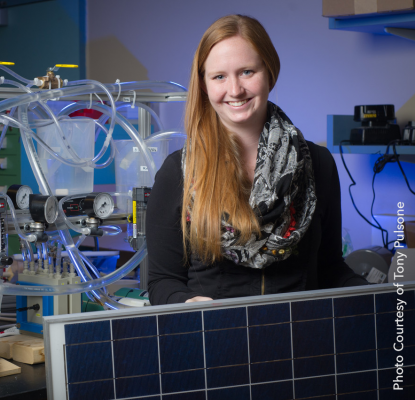Natasha Wright
Natasha Wright’s interest in design engineering began early. She helped her father rewire a toaster and built a large exercise gym for her hamster as a grade-schooler in Wayzata, Minn. She recalls that as she left for school each day, her parents reminded her to “work hard and play hard,” then waited for her to reply with a self-reminder: “And don’t forget to ask good questions.”
Natasha has been asking questions ever since, particularly about water quality. Much of her research and inventive work at the Massachusetts Institute of Technology (MIT) has focused on improving drinking-water quality and better understanding household water-usage habits in rural India and other areas. She travels to India three times each year to learn more about local water supplies and to complete field trials of her technology. In fact, the trips led her to define the need for desalination in the first place. Those efforts earned Natasha the 2017 $15,000 Lemelson-MIT Student Prize in the “Eat it!” category.
Natasha received a bachelor’s degree in mechanical engineering from the University of St. Thomas, in St. Paul, Minn., in 2012 and a master’s degree in the same field from MIT in 2014. She expects to complete work toward a PhD in mechanical engineering from MIT in 2018. She has worked on designing, testing, and developing solar-powered water-purification systems for Indian villages as a graduate research assistant in MIT’s Global Engineering and Research (GEAR) Lab since 2012. She has applied for and received more than $1 million in grants and other funding for continued work in that area. She led the MIT/Jain Irrigation team that won first place in the U.S. Agency for International Development (USAID) Desal Prize Competition in 2015, earning a spot on the Forbes 30 Under 30 in Energy list. She was part of a team that developed Smart Spout, an embedded sensor that measures how consistently people use their household water-treatment and storage systems. The Smart Spout invention won the grand prize in MIT’s 2014 Global IDEAS Challenge, an annual innovation and social-entrepreneurship competition that encourages students to tackle quality-of-life issues worldwide.
Natasha’s passion for engineering and global issues has led her to become a strong leader and mentor for others. She worked with several colleagues to launch a student-run maker space, MakerWorkshop, in MIT’s Department of Mechanical Engineering. She remains a mentor for MakerWorkshop, which now has about 800 registered members. She serves as an advisor in MIT’s Undergraduate Research Opportunities Program (UROP), a graduate resident tutor in a campus residence hall, a mentor to undergraduate teams in a project-based global engineering course, and a peer mentor in MIT’s Resources for Easing Friction and Stress (REFS) program, providing confidential support to mechanical-engineering students.
Natasha is a part-time instructor of inventive design at Tufts University in Medford, Mass., and she’s been an instructor in the Women’s Technology Program at MIT, a four-week residential summer offering for high-school students. In addition to teaching basic mechanical-engineering principles for that program, she provided hands-on demonstrations—for instance, drawing on her experience as a former varsity pole-vaulter, she used the bending of the pole to illustrate beam deflection and kinetic and potential energy. Previously, she was a research assistant in programs offered by the Center for Applied Mathematics at the University of St. Thomas.


